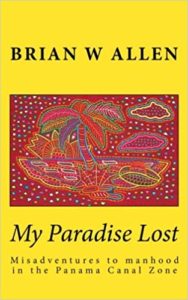 My Paradise Lost: Misadventures to Manhood in the Panama Canal Zone. Brian W. Allen. Jan 29,2013
My Paradise Lost: Misadventures to Manhood in the Panama Canal Zone. Brian W. Allen. Jan 29,2013
I didn’t know Brian Allen in the Canal Zone. In fact, the first time I met him was at the 2013 Panama Canal Reunion in Orlando. His book, My Paradise Lost, had been just published, and my book Canal Zone Daughter had been published the year before. At the reunion, I had a vendor’s table set up to sell and autograph books, and Brian also had a table to sell and autograph books. Unbeknownst to me, he’d arranged for our tables to be placed next to each other, which I thought was pretty cool. We had so much fun!
Brian calls Canal Zone Daughter, the companion book My Paradise Lost, and I completely agree. My Paradise Lost is told from a male perspective of Canal Zone life from the Atlantic Side, where he lived with his family. In contrast, Canal Zone Daughter presents a female’s perspective of Canal Zone life from the Pacific Side, where my family lived. So, readers of the two books are able to get a more rounded view of living and coming of age in the Panama Canal Zone during roughly the same time period 1960’s-80’s.
My Paradise Lost is a quick, easy read that’s so much fun. A reader can’t help but smile throughout the entire book because the stories crack you up. Brian writes in his folksy and humorous manner, which is exactly is personality. I love that it comes through in his writing. So many scenes in his book are my favorite: I can’t pick just one.
What I love is how Brian phrases details so that I’m transported right back home. For example, In the chapter “Ghosts of Ft. Randolph,” Brian writes about playing at one of the abandoned Ft. Randolph batteries, a military installation that had been boarded up. On the Pacific side (my side of the Canal Zone), we, too, played in various abandoned spaces that had been chain-linked fenced and topped with barb wire. The excitement and fun poking around and exploring those structures fueled such energy and imagination. There is no comparison to that kind of play today.
To get to the fort, Brian writes “An access road ran around back but we were all about shortcuts. All the better if they cut through impenetrable jungle. The field was overgrown with tall wild grass. Putting a hand out to push some aside, there was a slight tug and sting. A drop of blood oozed from an inch long razor cut.” We did the same on the Pacific side. So many times, we’d cut through the jungle and then realized we were surrounded by saw grass. Then, we would also move much more slowly and carefully to get out of the thicket. We had so many saw-grass cuts on our legs and arms. Since we normally wore t-shirts and shorts, our arms and legs were quite sliced up with grass cuts.
I absolutely enjoy the details that Brian recounts in his stories. If you lived in the Canal Zone, especially the Atlantic Side, this book will bring back many memories. If you’ve never lived in the Canal Zone, My Paradise Lost will give you a vivid description of an American boy’s life growing there. Loved reading it!